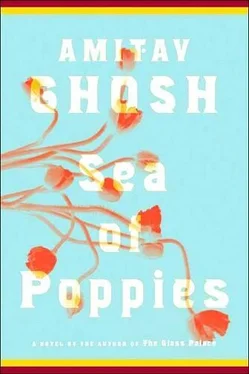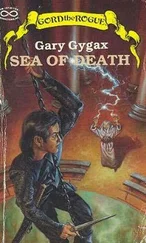bungal (*Roebuck): 'This word refers to the nautical "speaking-trumpet" – the instrument of amplification which permits ships at sea to communicate. Curiously, the usual Laskari pronunciation of it is byugal– which would seem to suggest that they discern in this object some mysterious kinship with the bugle'.
bunow/bunnow/banao (*The Glossary): 'This is, as Sir Henry rightly observes, one of the rare Hind. verbs to be adapted into English. But even after it had made the crossing it retained something of its original sense, which was more "to build" than "to make" – for one could certainly never say, as above, " bunowthe crossing".'
+burkmundauze/barkandaz: 'A term that was useful mainly for its imprecision, for it could, when necessary, be applied to any of that great paltanof paiks, piyadas, latheeals, kassidars, silahdarsand other armed guards, retainers and sentries who once thronged our streets. The gatekeepers and watch men whose duties kept them stationary formed a slightly different kind of paltan, composed of chowkidars, durwaunsand the like.'
+burra/bara: 'I am convinced that this is another word that has entered English through a nautical route, burra/barabeing the common Laskari term for the tallest of a ship's masts – the main.' See also dol.
Burrampooter (*The Glossary): 'This is merely the anglice , blessedly short-lived, of "Brahmaputra".'
+bustee/basti: 'In my childhood we used this word only to mean "neigh-bourhood" or "settlement", with no pejorative implication attached. The English derivative, on the other hand, was used to mean "Black Town" or "native area", being applied only to the areas where Bengalis lived. Strange to think that it was in this derogatory guise that it was passed back to Hind. and Bengali, and is now commonly used in the sense of "slum".'
butcha/bacha (*The Barney Book): 'A word for "child" that will undoubtedly migrate through the open windows of the nursery.' Neel was wrong about this.
buy-em-dear: See bayadère.
buzz: See shoke.
+caftan/qaftan: See choga.
caksen/coxen (*Roebuck): 'It is puzzling that Roebuck lists this as the Laskari word for "coxswain", since the pronunciation of it is indistinguishable from the English.'
caleefa/khalifa (*The Glossary): See bobbachy.
+calico: 'Some dictionaries award this word a Malayali lineage, since this kind of cotton cloth was said to be a product of the Malabar coast. This is utter buckwash, for the word calicoself-evidently comes from "Calicut", which is a place name introduced by Europeans: were the word derived from the town's Malayalam name the cloth would be known, surely, as "kozhikodo".'
calputtee (*Roebuck): 'The Laskari for "caulker", this was a mysterywho found little employment on Indian vessels, which were generally rabbeted rather than caulked.'
carcanna/karcanna (*The Glossary): Already in Neel's lifetime this long-pedigreed English word (from Hind. kar-khana, 'work-place' or 'work-shop') was slowly yielding to the term 'factory' – a lexical scandal in Neel's ears, which were still accustomed to hearing that word used to designate the residence of a 'factor' or 'agent'. But it was not for nostalgic reasons alone that he mourned the passing of carcanna/karcanna: he foresaw that its wreckage would also carry into oblivion many of those who had once worked in these places of manufacture – for example the factory-clerks known as carcoons. It was in mourning the fate of this word that the unknown wordy-wallah penned his comments on logocide.
carcoon (*The Glossary and *The Barney-Book): See above.
chabee (*The Glossary): In an uncharacteristic display of restraint, Neel refused to enter into the controversy over whether the Portuguese word for 'key' had set sail for England from Portugal or Hind.
+ chabutra / chabutter: See bowly / bowry.
+ chaprasi / chuprassy: See dufter / daftar.
+charpoy: As noted earlier (see bandar), Neel was of the opinion that words, unlike human beings, are less likely to survive the rigors of migration if they travel as couples: in any pair of synonyms one is sure to perish. How, then, was he to account for the journey of those eminently successful synonyms, charpoyand cot(both of which, un -beknownst to him, were to receive the Oracle's imprimatur)? Neel was clearly annoyed by this anomaly – ('Has Blatty no words for the comforts of the bed, that it must steal so wilfully from us?') – but he did not fail to recognize the threat that was posed to his pet theory by these paired words. 'English, no less than the languages of Hind., has many reasons to be grateful to the lascars, and the gift of the word cot(from Hind. khât ) is not the least of them. There can be little doubt that this word entered the English language through a nautical route: it is my conviction that khat was the first Laskari word for "hammock" and that jhula/jhoola only came into use when the original was confiscated by their malums(vide the Admiral's definition of cot: "a wooden bed-frame, suspended from the beams of a ship for the officers, between decks"). These cotswere clearly more comfortable than ordinary hammocks, for they were soon passed down to ships' infirmaries, for the benefit of the sick and the wounded. This, by extension, is the sense in which the word was swept into the main current of the English language, being adopted first as a name for the swinging cribs of the nursery. We see thus that contrary to appearances, cotand charpoyare no more synonyms than are "cradle" and "bedstead". Nor indeed are they synonyms even in Hind., for I am convinced that charpai was originally applied to all four-legged pieces of furniture (in the precise sense of the Hind. char-pai , "four-legged") in order to distinguish them from such objects as had only three legs ( tin-pai or tipai – from which, as Sir Henry rightly observes, descended those small tables known as teapoysin English). The confusing term sea-poy, however, is merely a variant spelling of sepoyand has nothing whatsoever to do with legs or seasickness. The ghost of this peculiar misconception is yet to be laid, however, as is evident from a story I was recently told about a young lieutenant who came to be separated from his troops while boarding a ship. It is said that after crying out in alarm – "I've lost my sea-poys!" – he was taken further aback at being handed a baltyand some smelling salts.'
charter: 'Although the Oraclemakes no mention of it, I am convinced that this verb was often used in the same sense as the Hind. verb chatna , from which English received the resplendent chutney, "good to lick" (not to be confused with chatty/chatta, which lascars were accustomed to apply to earthen vessels). The cant term charterhouseis frequently applied to houses of ill-repute.'
Читать дальше












